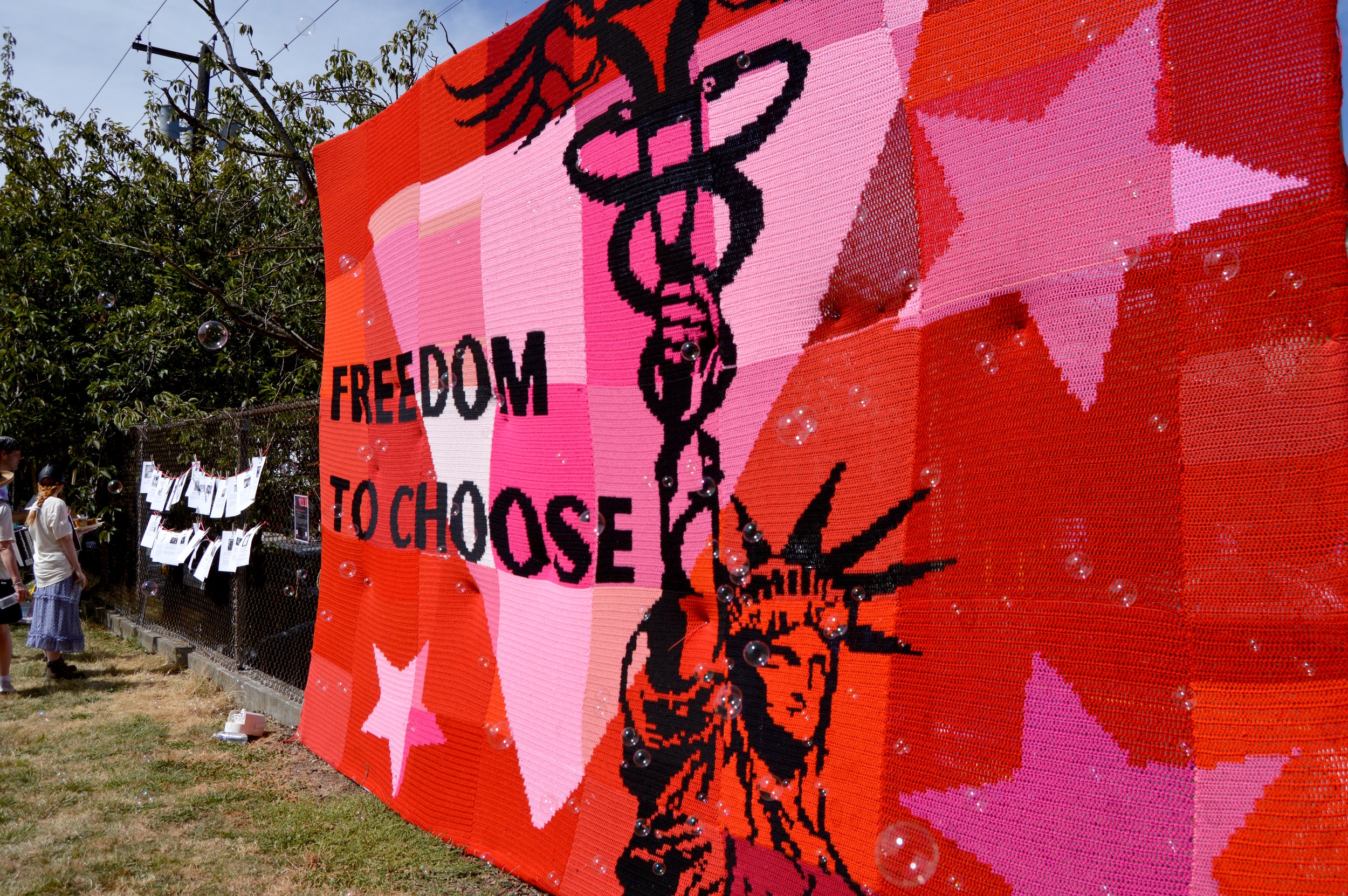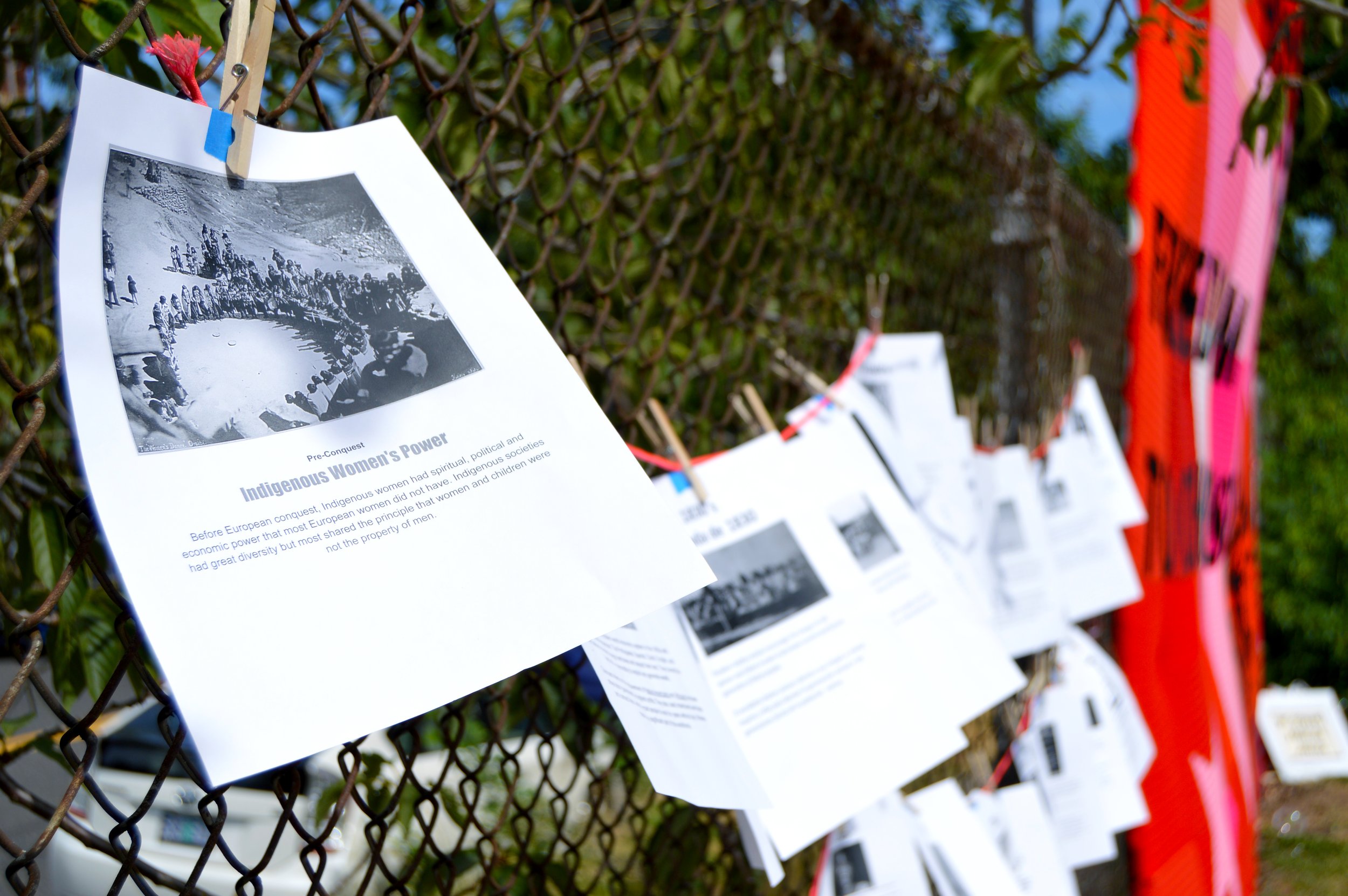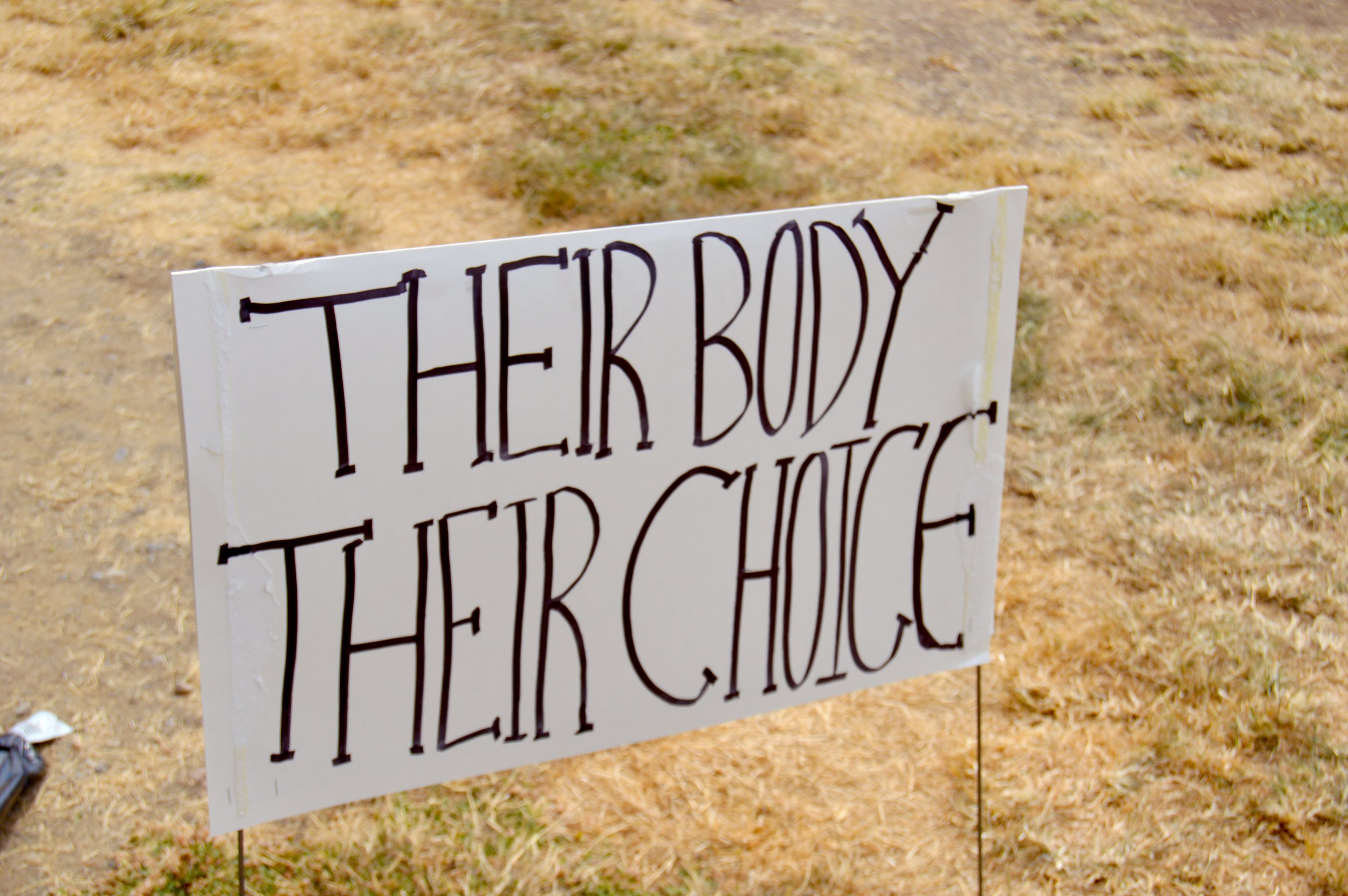
(Image caption) The Liberty Crochet Mural, curated by Jen LaMastra, aims to raise awareness in response to the overturning of Roe v. Wade. The mural con- sists of 40 squares that were assigned to crochet artists all around the country. Their ultimate goal is to create a mural for every state in America as abortion restrictions worsen.
Keepers of the Sanctuary State
Oregon locals are fighting for safe and legal abortions in the post-Roe world.
Written and Photographed by Megan McEntee
Illustrated by Elena Kato and Jordan Scott
Appeared as the cover story in Ethos Fall 2022.
On June 24, 2022, community member Bre Lynn led a march through the streets of Eugene, their good friend Monica Little by their side. When they both woke up that morning, neither of them expected to be handed a megaphone by a fellow protester. Little didn’t expect to leave work early, and Lynn didn’t expect to hear their voice ringing in the ears of a crowd. They didn’t expect to hear that countless people across the country would be turned away at their local abortion clinic that day.
They didn’t expect Roe v. Wade to fall.
Lynn received an abortion 23 days prior to the ruling.
“It was probably one of the hardest things I've ever done in my whole life,” Lynn says. “And I fully believe it was the right decision.”
The timing of Lynn’s abortion and the Roe decision prompted them to take immediate action. But while leading the march on June 24, both Lynn and Little couldn’t shake the feeling that there was something more they could do.
“It’s cathartic to yell and make people listen,” Little says, “but it still feels like not enough.”
Roe v. Wade was a case originally brought forth by Norma McCorvey — who chose “Jane Roe” as a legal pseudonym. McCorvey wanted an abortion, but she lived in Texas, where abortion was illegal unless the situation was life-threatening. She sued Henry Wade, her local district attorney, and the case was brought to the Supreme Court. The Supreme Court ruled in her favor, deciding that abortion was a constitutional right under the 14th Amendment’s due process clause, which establishes a baseline “right to privacy.”
This decision voided many state and federal abortion restrictions and was a major stepping stone in the journey towards bodily autonomy for Americans who require reproductive healthcare. Abortion has always been a controversial subject and sits in a gray area for many citizens – especially those in religious communities. Roe v. Wade stirred up insurrection within these religious communities, sparking an ongoing battle between pro-life and pro-choice movements.
(Image caption) Along a chainlink fence at Abortion Justice Field Day, flyers outlining Indigenous history wave in the wind. Rodriguez and other Planned Parenthood representatives speak to attendees just a few feet away. “It’s really important within the Latino community to unpack and address anti-Blackness and indigenous sovereignty as it relates to our issues,” says Rodriguez.
“I had no idea the type of power that I have to make things happen. Now I’m just so inspired to do even more.”
“Reproductive justice is directly tied to the decriminalization of our bodies and bodily autonomy,” says Rodriguez. “That relates to a Latinx identity when you're already being told that your existence and presence is illegal. I want to encompass that bodily autonomy and land sovereignty are definitely interconnected. This is something that should never be ignored.”
According to Rodriguez, the Latinx community has a lot more access in Oregon than in other states and countries. Specifically, the increased access to reproductive care for undocumented residents can be attributed to the Reproductive Health and Equities Act (RHEA). RHEA is a landmark bill that was passed in 2017 and ensures reproductive rights for every resident of Oregon, including undocumented and transgender residents. It also allocated public funding to provide reproductive care for those who can’t receive Medicaid, and codified the right to a safe and accessible abortion.
Christel Allen is the executive director of Pro-Choice Oregon, a self-described “grassroots pro-choice advocacy organization.” Pro-Choice Oregon was a vital group in the Pro-Choice Coalition of Oregon, or PCCO, which is the organized body that advocated for RHEA.
The road to RHEA was long and littered with obstacles, according to Allen. She points to a report from the Building Movement Project, which tells the story of RHEA through the hardships that PCCO faced. Allen came to PCCO a few months after the decision, but she says the report described the lack of diversity in the coalition before further integration and intersectionality efforts, and also the subsequent success of the bill after those integration efforts.
“If you were to look at the pro-choice movement in Oregon seven or eight years ago, it looks nothing like the type of work we do now,” says Allen. “There was definitely a need for accountability conversations, learning and growing.”
Allen says that these conversations will prove vital in creating a more equitable reproductive landscape. There are many systematic barriers in access to reproductive services for BIPOC, according to an article in the Obstetrics and Gynecology Journal. The article states that these barriers are caused by social and structural factors, including fewer health services in historically BIPOC neighborhoods, systematically depleted wealth and education and discrimination by biased healthcare professionals.
“The reproductive justice movement has been telling us for decades that none of us are free until all of us are free,” says Allen. Pro-Choice Oregon has committed to continue intersectionality efforts in Oregon’s reproductive landscape.
A few months before the Roe decision, Allen helped to advocate for the Oregon legislature to pass a bill allocating money to the Oregon Reproductive Health Equity Fund. The fund set aside $15 million to put towards reproductive and gender-affirming care. The money was put in the hands of Seeding Justice, an organization that funds grassroots liberation movements of all kinds and is responsible for managing the fund equitably.
Allen says that this kind of equitable advocacy is partner-driven.
“I'm a big believer in collective power,” she says. “I want us to take all of the rage and sadness that we’re feeling and use that as fuel.”
Allen found herself hit hard by the Roe decision, but as the representative of a large organization, she also found it important to separate her personal grief from the grief of her constituents.
Grief is a common struggle for those seeking reproductive justice, according to Martina Shabram, executive director of Sexual Assault Support Services of Lane County (SASS). And she says that “ambient trauma,” a feeling of fear and helplessness, is a result of the consistent and belligerent sexualization of people with uteruses.
“When the state makes reproductive decisions about a person's body, that is a form of sexualized violence,” says Shabram. “It, in and of itself, is a violent act.”
SASS provides anonymous support to anyone who has experienced sexual violence. They have a 24-hour anonymous support line for survivors, educate in schools and provide peer-led counseling. The staff are not mandatory reporters, which is a deliberate decision in order to give survivors an outlet without any legal involvement.
SASS was just one of the organizations that attended Abortion Justice Field Day in Eugene on August 14, 2022 and in Portland the following week. Both events featured booths from advocacy organizations among typical field day activities, such as tie-dye tee shirts, cornhole and a giant rainbow parachute.
A few attendees recorded video testimonials at the Planned Parenthood booth, while others were able to share their story anonymously on small slips of paper. Rebecca Nelson, Southern Regional Field Organizer with Planned Parenthood, helped facilitate these activities at both the Eugene and the Portland event.
“It has felt amazing to connect with the community and other organizations, and just find joy where we can,” says Nelson. “We're in this together — and we have each other's back.”
Planned Parenthood Advocates of Oregon is primarily focused on legislative advocacy, grassroots organizing and educational campaigns, according to their official mission statement. In the wake of the Supreme Court decision, PPAO has been working in overdrive. They immediately responded by organizing rallies on the day of the decision, according to Nelson. Having joined the team in March of 2022, Nelson’s time with PPAO has almost entirely involved responding to the fall of Roe.
“It's been a whirlwind having to respond with very little turnaround time,” says Nelson. “It was heartbreaking. We've been expecting this, but the reality of actually hearing the leaked opinion and then the decision — it was devastating. I didn't have time to process the emotion, I just needed to keep working and respond.”
(Image caption) Abortion Justice Field Day fostered a friendly environment; with activities geared towards people of all ages – and their furry friends.
(Image caption) Liberate Abortion signs are a common sight for those on the front lines. The Liberate Abortion Campaign is a coalition of over 150 organizations across the United States. They aim to “expand power, grow compassion, provide education and build a groundswell of support” for abortion access and reproductive rights, according to their official mission statement.
Dobbs v. Jackson Women’s Health Organization officially became the case that overturned Roe on June 24, 2022 — abolishing abortion protections on a federal level. Abortion rights were not “deeply rooted in this nation’s history or tradition,” according to the Supreme Court.
Oregon sits in a unique position as a sanctuary state, meaning that despite the Supreme Court decision, Oregon lawmakers are passing bills and providing funding to protect the right to abortion within state lines. On the day that Roe fell, Governor Kate Brown signed the Multi-State Commitment to Reproductive Freedom alongside the governors of Washington and California. This commitment serves to protect in-state residents’ rights to safe and accessible reproductive healthcare, as well as out-of-state citizens’ rights to asylum and treatment.
However, the term sanctuary state has a history beyond the context of reproductive rights. According to America’s Voice, an immigration reform advocacy group, the terms “sanctuary state” and “sanctuary city” have been used to define areas where U.S. Immigration and Customs Enforcement officials and local law enforcement are discouraged from reporting anyone’s documentation status, unless they are involved in a serious crime or investigation. Various reproductive rights movements and state legislators adopted that term in a new context, while still keeping similar themes of asylum and privacy.
Aside from the legislation, what really defines a sanctuary state is community organizing and advocacy, according to members of abortion advocacy groups. Many Oregon residents, such as Lynn and Little, are passionate about helping those who are more greatly impacted by reproductive injustice. This passion has transformed into action through protests and mutual aid fundraisers — a way to raise money in a community-oriented, symbiotic way.
“We have been running off the generosity of our communities for a long time,” says Mikaela Byers, Board Member and Travel Coordinator at the Northwest Abortion Access Fund (NWAAF).
NWAAF is a mutual aid fund with the mission to break down barriers regarding access to abortion. Spanning over four states — but helping abortion-seekers all around the country — NWAAF provides funding directly to clinics, hotels and airlines, so people can receive the healthcare they need. The fund has been around for over three decades.
“I would just love if more people knew about us,” Byers says. “If they need us, I want them to know we exist.”
According to Byers, one of the most effective forms of outreach is local, community-organized events. After their march through the streets of Eugene the day Roe was overturned, Lynn and Little decided to put together a fundraiser.
Their event, called Abort the Court, took place at the Old Whiteaker Firehouse, a popular meeting place for local activists in Eugene. They saw the importance of mutual aid and decided to raise money for NWAAF.
On July 21, a makeshift stage stood as the focal point for the fundraiser. Various speakers shared their experiences and frustrations with the crowd as they mingled with local vendors and activists.
“That event just felt very Eugene,” Byers says. “It felt a lot more Eugene than other events that aren’t put on by local community members. This one felt really genuine.”
Abort the Court raised over $8,500 for NWAAF, exceeding their original goal of $5,000. Abort the Court raised this money through donations from attendees, supporters and vendors.
“I had no idea the type of power that I have to make things happen,” Little says. “Now I'm just so inspired to do even more.”
Since the Supreme Court decision to overturn Roe, NWAAF has experienced a surge in both donations and calls for help. It’s a double-edged sword, Byers says, because while exposure and funding have increased immensely, so has the demand for their services.
“It’s weird to reckon with that fact,” Byers says. “It's bittersweet that this is what it takes for people to be interested in your organization and what it does.”
One of the ways that NWAAF is increasing funding and access is by partnering with similar organizations, such as Cascades Abortion Support Collective (CASC). CASC is an organization that offers practical support to Oregonions seeking abortion services — such as transportation, contraception and aftercare – using NWAAF’s funding. According to Carlene Ostedgaard, a CASC board member, the organization began by serving the Portland metro area a few years ago, and expanded to the entire state of Oregon about a year-and-a-half ago.
In the post-Roe landscape, CASC has been working in overdrive. This includes expanding their service area beyond Portland.
“We’re doing what we've always done, and just doing a lot more of it. It does mean we're going to need a larger volunteer network,” says Ostedgaard. “The overwhelm of the decision, it feels like CASC is Sisyphus – and we're just gonna push that damn rock up the hill.”
Access to abortion and reproductive healthcare has always been an uphill battle, even before Roe was overturned. Although abortion rights were federally protected by Roe, states still had the wiggle room to put up their own barriers through written and unwritten policies. Many states had limits on how late in someone’s pregnancy they were able to get an abortion. Some states only had one or two abortion clinics, according to the Guttmacher Institute, and required extensive pre-appointment visits, which is often not feasible for someone without the funds for travel, room and board.
The barriers to accessible reproductive healthcare increase exponentially in communities of color, specifically Black, Indigenous and Latinx communities. Mariana Paredones Rodriguez is a fellow at Raíz, Planned Parenthood’s program dedicated to reducing stigma and providing access for Latinx individuals seeking reproductive healthcare.
According to Rodriguez, one of the largest barriers for the Latinx community is stigma. According to an article from the New Yorker, this stigma can manifest from a lack of sex education, language barriers in abortion clinics and judgement by peers and religious leaders.
“I would say this is part of the healing that needs to happen within our community,” Rodriguez says, “as it relates to regaining trust with health, healthcare and not being neglected.”
Planned Parenthood’s website states that Latinx individuals have some of the highest uninsured rates in the country. According to Rodriguez, this is one of the financial barriers for Latinx individuals rooted in institutionalized racism, as well as a lack of access for undocumented folks.
(Image caption) Lynn and Little are both passionate about inclusive language in conversations regarding reproductive rights. “This issue is not just about women, it’s about trans and nonbinary people too,” says Little. “It’s important to make sure that everybody who is affected by this feels heard and cared about.” In post- Roe Oregon, using gendered terms is a practice that many individuals are shying away from.
“I’m a big believer in collective power. I want us to take all of the rage and sadness that we’re feeling and use that as fuel.”
Many representatives express the same sentiment as Nelson, and are now finding ways to move forward collectively.
Raíz will focus on not only access to reproductive healthcare, but access to overall healthcare for BIPOC and undocumented folks. According to Rodriguez, a primary focus of the program is making sure the Oregon Health Plan is accessible for these individuals, because real change starts at the source.
Pro-Choice Oregon will continue working with the Oregon legislature to ensure that abortion access remains safe in this state. Allen says it is important to be neighborly beyond borders, and continue to fight despite ambient trauma and collective grief.
Lynn and Little will continue to do what they can as activists. They want to advise their community to not give up or become complacent, because nobody truly knows what will happen in the future, they say.
According to those on the front lines, the loss of Roe makes room for even more progressive policy, and the opportunity to fill the cracks in America’s reproductive healthcare system. They have stressed that it’s just a matter of taking action, and playing to everyone’s individual strengths.
“What happened this summer is an attack on our very democracy, and our democracy is what we make of it,” Allen says. “It doesn't work without all of us.”





